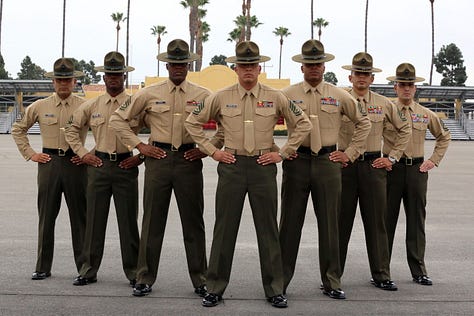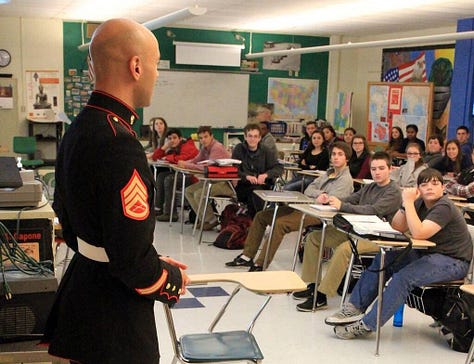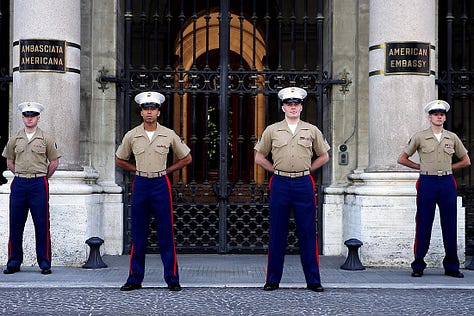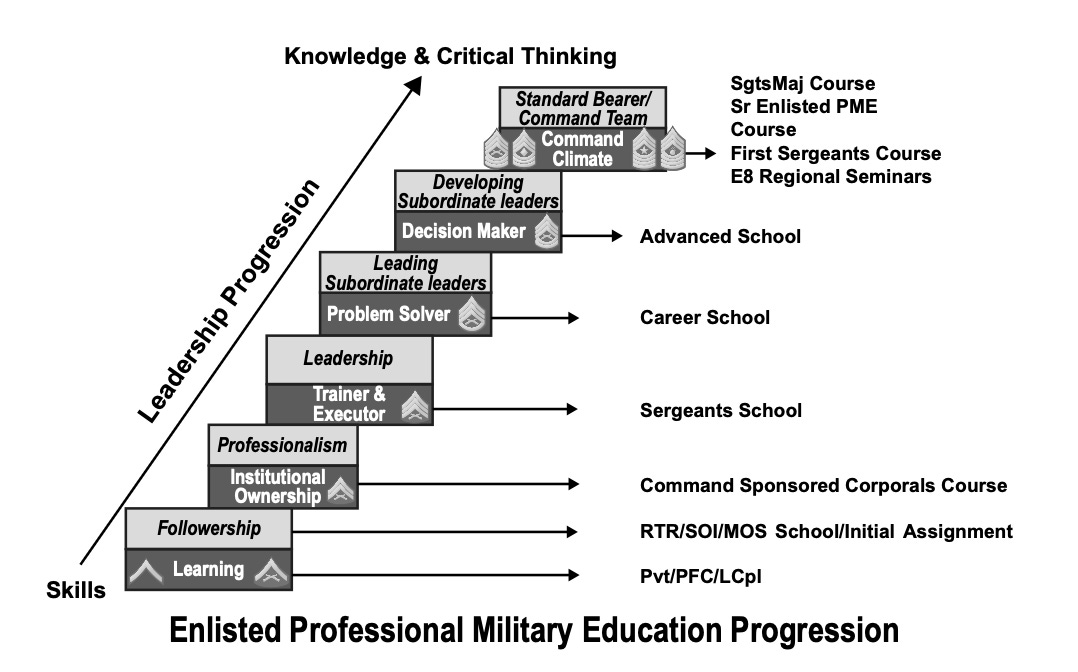USMC How To: Age Gracefully
Guided Discovery.

What do you do with your expertise?
Suggested Reading
MCTP 6-10A, Sustaining the Transformation
Pages 5-1 through 5-20 based on printed document (PDF pages 73-92)
Description of general responsibilities and expectations of more senior enlisted Marines as they progress through the later stages of their careers
Link to MCTP 6-10A on the US Marine Corps Publications Electronic Library
This week’s Study: First Salute
All excerpts below are from MCTP 6-10A
Guided Discovery
“I carry myself with military grace, unbowed by the weight of command, unflinching in the execution of lawful orders, and unwavering in my dedication to the most complete success of my assigned mission.”
USMC Staff Non-Commissioned Officer (SNCO) Creed
Arriving at the point of our careers where we’re expected to ‘know things’ is a jarring experience. One day we were in control of our own space, comfortable in our ability to lead within specific parameters, and then, without warning, we realize we’ve grown a head taller than our peers and a senior leader is staring straight at us, expectantly.
Every organization’s pyramid looks different, so arrival times to this point vary, but in the United States Marine Corps, it’s marked by promotion to Staff Sergeant. Staff non-commissioned officers (SNCOs) align to the enlisted ranks of Staff Sergeant and above. These are the Marine’s senior enlisted leaders.
5-1. The primary role of senior enlisted leadership is to shape the future of the Corps. It is their responsibility to contribute to the betterment of the institution for the sake of the Marines around them. At the same time, they must continue improving themselves to remain current and retain their value. Some of the main areas of balancing personal advancement with servant leadership are investing sacrificially, avoiding the expectation of entitlement in their position, and supporting the institution.
They are also decidedly mid-career within the Marine Corps. They have many years of work and leadership ahead of them, both in the Marines and potentially later in a civilian role. Balancing responsibilities to others (as a leader) and self (as one who must sustain their own transformation) is challenging.
5-2. For SNCOs, the scale tips more heavily toward others and away from themselves, but they cannot abandon their own development and advancement entirely. Marines who focus too much on giving to the next generation without receiving will become depleted.
Balancing time and energy spent on others and self appropriately. Challenging.
5-2. Marines must find the right balance between taking care of themselves and taking care of others. While easy to view peers as being in competition, they are mutually supporting elements that work together as a team toward both individual and unit accomplishment. Personal and professional endeavors are continually overlapping, each reinforcing the other for better.
Working with peers, who are our competition for future promotions, without treating it like competition. Challenging.
Not abandoning personal endeavors while maintaining our professional development. Challenging.
This is also the point in our careers where families might be blossoming, parents might be aging, or we find it difficult to allocate time to maintaining hobbies and friendships. Challenging.
How do we age gracefully, to become a mature leaders, given the overwhelming expectations and complicated balancing required?
It requires embracing the leadership roles and expectations in a way that is new and different from how we’ve engaged in our careers thus far.
Senior enlisted non-commissioned officers are the leadership cohort that simultaneously represent continuity and evolution. Senior enough to have survived the trials that reinforce the criticality of the values and technical requirements…but still close enough to the action to understand what is evolving in real-time and able to be the agents of change.
But there is one more balancing act this creates:
5-2. Although opportunities exist for SNCOs to create enterprise-level change, most SNCOs will find the greatest opportunities to mold the future of the Corps at the individual level—specifically in the routine interactions with their Marines.
The accumulation of expertise and understanding improves our perspective on what can and should change in the world around us, but this perspective scales faster than our abilities and influence to enact change. A common point of frustration, and one that can become debilitating if dwelled upon too intently.
Even as the Marines expect staff non-commissioned officers to increase their impact in wider and more strategic ways, they exhort them to remember where their greatest impact will (almost) always be felt: interpersonal interactions.
5-3. Most Marines can think back on a SNCO who shaped their career in some way. Drawing on that influence, SNCOs should also take the time to recognize the position of influence in which they now find themselves. It can be humbling to realize that they no longer look to “The Gunny” for motivation and esprit de corps, but instead they are The Gunny.
Accepting this position is a decision. The opportunity must be embraced continually - it is not a one-off choice. Everyone gets older, but how we age and mature as leaders depends very much on how we show up every day.
Staff non-commissioned officers are called to be unwavering in their dedication to the most complete success of their assigned missions. The missions are to others and self.
What do you do with your expertise?
How do you balance your assigned missions?
Is your expertise a personal strength, a team strength, or an organizational strength?
The Marines suggest five actions in which SNCOs should take with their growing expertise to create the most complete successes for others and themselves.
Invest Sacrificially
Avoid Entitlement
Be Excited About the Organization
Embody the Role
Ingest and Share (More) Knowledge
None, individually, is difficult. Combined, performed continuously, they are a challenge worthy of a growing leader. They are what we should be doing with our expertise.
Invest Sacrificially
The act that most typically underscores the quality of servant leadership is sacrificial investment. We know it when we see it.
5-3. To sacrificially invest in a Marine means to devote valuable time and energy into that Marine, expecting those efforts to pay off for both the individual and the Corps. Because of the transient nature of Marines, often the SNCO does not get to see the results first-hand, but invests anyway.
I can honestly think of no better definition of sacrificial investment than the choice to invest time and energy in a person without expectation of first-hand payoff.
This can be mentorship and coaching, but it can be spot corrections or sharing a tough truth as well. Opportunities to invest sacrificially will originate organically as often as they are manufactured (through training or formal interactions).
The investment of time is a given, but the investment of energy, and the benefit thereof, is commensurate with the expertise applied in the exchange.
5-4. For example, an NCO may be able to teach a junior Marine how to perform a task more efficiently or more accurately, but a SNCO may be able to tell that Marine of a time when being able to perform that task saved their life or the life of a fellow Marine.
Marines, like all of us, are not looking to hear war-stories. We need practical guidance that will help us in the future. Investing sacrificially is not sharing information to help pass a test, it is imparting the wisdom, borne of experience and expertise, that will prove to be critical when one’s life, or career, is on the line. Knowing what these lessons are, and how to embed them, is actual hard work.
5-4. The SNCO who reads books on leadership, communication, and psychology to better understand their Marines is selflessly setting the next generation up for success.
These are investments made with the passion that only comes from the confidence of expertise: we are sharing not only what we believe, but what we know to be true and of upmost importance, and we will not stop investing because we know it makes a difference.
5-4. This is a vital role that the SNCO fills for their Marines, but they must be willing to give their time and energy to passing on those lessons. Investing in a better Marine Corps will almost always require sacrifice.
How do you recognize opportunities to invest sacrificially?
Do you find it easy or difficult to invest when there is no immediate payoff?
What expertise should you share more of via sacrificial investment?
Avoid Entitlement
To victors go spoils, to increased rank goes privilege.
5-5. Staff noncommissioned officers have an increased expectation of responsibility and accountability, as well as increased access to privileges.
The risk, for any human, is allowing privilege to become entitlement. This is the same for privileges granted by an organization (access, perks) as well as privileges earned through the individual’s efforts (respect for their knowledge, etc).
Developing expertise generates privileges, but an expert that believes their expertise has earned them permanent, inalienable special treatment, will quickly find both their expertise and respect eroded.
5-5. Entitlement, the belief that one is inherently deserving of privileges or special treatment, is the antithesis of the selfless leadership expected from Marines. With the wrong attitude, certain privileges that have been granted due to a blanket expectation of trust and respect have the potential to be abused. It is important for SNCOs to understand that the authority, privileges, and allowances entrusted to them are about exactly that—trust.
Continuing to build trust is what we must do with our expertise. Safeguarding against entitlement keeps momentum on the side of building. It is a continuous activity.
5-5. It is incumbent upon each individual Marine to continue to validate this trust every day.
On an individual level, avoiding entitlement is how a developing leader stays clear of the trap of ‘settling’. Entitlement is most often paired with a feeling of arrival, of a threshold being crossed. This is never the case for Marines and it is certainly not relevant in our professional and personal lives.
5-5. Those SNCOs who continue to sustain their transformation will draw the line between responsibility and entitlement.
Are all your privileges related to job requirements?
How do you guard against feelings of entitlement?
Be Excited About the Organization
Marines have a reputation of being fanatical about the Marine Corps. Let’s just call it passion.
Passion is an excellent trait. Young Marines are passionate because they are told to be. SNCOs are passionate because they understand what the Marine Corps represents.
5-6. A healthy appreciation for the Corps’ worldwide influence brings a sense of custodial responsibility.
Contrary to a lot of pop culture and social media, it is, in fact, good to care about things.
Enthusiastic leadership that is authentic to an individual’s style and the demonstration of passion for the intentions and qualities of the organizations with which one associates is the mark of a mature leader.
Expertise also can mean being passionate, and sharing one’s excitement, for maintaining and exceeding standards.
5-6. Adhering to expectations, requirements, and standards, not just as a Marine but as a SNCO, supports the entire institution from top to bottom and takes the initiative to make improvements when opportunities arise. The SNCOs who regularly sustain their transformation understand the potential positive and negative implications of their actions.
Attitude is infectious, and mature leaders and experts are responsible for setting a tone of excitement for the organization.
How do you demonstrate excitement authentically?
If you cannot get excited about your organization, what should change?
Embody the Role



These are Marines that embody the role. They are trusted to be the front-facing, public representation of what the USMC believes itself to be. They are ambassadors.
5-7. Special duty assignments, often times referred to as independent duties, require high levels of moral, mental, and physical resilience. The three special duty assignments in the Marine Corps are recruiting duty, drill instructor duty, and Marine security guard.
Leadership in these roles requires both expertise and the the moral, mental and physical traits that reflect the core values and expectations of the organization.
5-8. During this duty they may interact with a veteran who regrets leaving the service, a neighbor who respects their commitment to duty, an outspoken individual who insults the Marine’s service, or any other number of individuals’ beliefs and backgrounds. While these experiences may challenge or bolster the Marine’s commitment to service, the Marine is required to always uphold the core values and respond professionally to any interaction.
Whether a recruiter, a drill instructor, or a guard at an embassy, these Marines are expected to (and chosen because they) look and act the part of a mature, expert Marine. As flawlessly as possible, as continuously as possible.
5-9. …the Marine drill instructor must find a way to impart everything it means to be a Marine. One of the primary ways they do this is through their own conduct.
What they do with their expertise and experience is put it on display for the world to see and judge: prospective Marines (and their parents), basic trainees at boot camp, or the random person coming to a US embassy for a visa.
5.11. Marines filling special duty assignments are the gatekeepers of the Corps’ core values.
If we do not embody the values of our organization and what we hold to be valuable, then we are likely embodying something else. This divergence is always noticed.
Can you identify individuals that embody your organization?
What ambassador-style roles exist in your organization and how are people selected for these positions?
Ingest and Share (More) Knowledge
5-13. There is no point, personally or professionally, where one “knows it all.”
There is not a finish line for expertise or leadership development. Consistent with every other level of leadership in the Marine Corps, the expectation is continued education and investment in one’s own knowledge base, both through formal and informal means.
Even the senior most non-commissioned officers have schools.
5-13. These courses, schools, and symposiums are not checks in the box for promotion or retention, they offer an opportunity for Marines to reassess their own performance and interact with their peers.
There are myriad reasons for prioritizing this education (the Marines force it, your employer most likely does not). Peer interaction, as a secondary benefit, is not to be overlooked as fundamental to development. Maintaining connections to the cohort of leaders progressing at our pace through an organization provides support for our mental and emotional fitness.
Training, whether as trainer or trainee, is also a chance to share lessons.
5-18. The journey does not end when the deed is complete, but after sharing lessons learned along the way.
How do you capture individual knowledge from experts in your organization?
Is continuing education an enriching experience or does it feel like a chore? What might need to change?
SNCOs are experts. They are highly visible leaders. They should embody what the Marine Corps values. And they need to share the expertise. For others, for themselves, for the organization.
5-18. As SNCOs engage with new Marines, it is particularly important to be the Marine they needed as a mentor when they were young. This is not the time to dismiss Marines with remarks of generational differences.
5-19. Newly commissioned officers will rely on SNCOs’ seasoned professionalism to help guide them to make the right decisions as new leaders. The officers they mentor bear accountability for the decisions they make and should be provided with relevant written orders and policies, whenever possible.
The responsibility is great because the risk of failure is existential…
5-19. Staff non-commissioned officers who are not prepared to meet the needs of those who depend on them create a ripple effect of negativity.
…but the challenge is worth it because the impact is so great.
5-20. …a SNCO who takes a single Marine or a classroom full of them and imparts wisdom honed from years of experience will make a lasting impact on those Marines. It will make a difference to them.
What do you do with your expertise?
Questions for Individual Reflection
"The primary role of senior enlisted leadership is to shape the future of the Corps." How does this compare to your role as a leader in shaping your organization's future, and what actions are you taking today that will have the most significant impact five years from now?
What is one area where you could invest more sacrificially in developing future leaders, and what return on investment would justify this sacrifice for both you and your organization?
How have you witnessed entitlement manifest among senior leadership in your organization? What systems do you have in place to combat this tendency in yourself?
Looking at your current professional and personal goals, do they truly reflect your position, or are they more appropriate for someone at a lower organizational level?
What mechanisms have you established to ensure your hard-earned insights are systematically shared throughout your organization or in your personal life?
Professional Discussion Prompts
Examine the concept of "ambassadorship" in your organization - who serves as your corporate ambassadors, how are they selected, and how do you ensure they maintain the highest standards?
Discuss how your organization uses rotational assignments. Do they adequately prepare leaders for broader responsibilities or merely serve operational needs? Are there opportunities for improvement?
Evaluate your organization's knowledge management practices and whether they effectively capture and transfer critical knowledge before experienced leaders depart. What might need to change?
Marine SNCOs mentor both peers and officers. Discuss the cross-functional mentoring capabilities in your organization and how effectively senior leaders mentor colleagues outside their direct reporting relationships. Do any senior leaders look for mentors who are lower than them in the pyramid?
Personal Discussion Prompts
How do you pass on life lessons to family members or people in your community. What barriers prevent you from doing this more effectively?
Reflect on privileges you've earned in your personal life and discuss how you ensure these don't negatively impact your relationships or world view.
Recall what and who you needed as a mentor in your early career. How does this influences your interactions with younger professionals today?
The text mentions how effective SNCOs create "a ripple effect" through mentorship. Discuss a personal relationship where your influence has created positive effects beyond the person you directly mentored.
How do you maintain personal standards in environments where expectations may be lower? What types of tension does this create in your personal relationships and how do you manage it?
Exercises
Sacrificial Investment Analysis
Exercise:
Each leader calculates the approximate hours per month they currently spend developing others with no immediate payoff for themselves.
Discuss whether this time investment is sufficient and brainstorm high-impact developmental activities that would justify additional time investment.
Debrief:
What organizational barriers prevent more sacrificial investment in developing others?
How might we better measure and recognize developmental contributions that do not show immediate results?
What specific capabilities would improve across the organization if we all invested more sacrificially?
Entitlement Audit
Exercise:
Divide into pairs. Each leader identifies three privileges they receive due to their position that could potentially create feelings of entitlement. Challenge each other on whether these privileges remain tied to responsibility or have drifted toward entitlement.
Each pair develops one concrete action to address potential entitlement issues at the leadership level.
Debrief:
How comfortable were you discussing potential areas of entitlement with your partner?
What organizational structures currently reinforce entitlement rather than responsibility?
What early warning signs could help identify when healthy privilege is becoming unhealthy entitlement?
Feel free to borrow this with pride and use with your teams, professionally or personally. If you do, please let me know how it went and tips for improvement: matt @ borrowingwithpride.com

